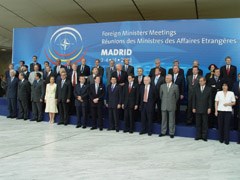- Published: 04.06.2003.
The Ministerial Meeting of the EAPC was held in Madrid...
The Ministerial Meeting of the Euro-Atlantic Partnership Council was held on 4 June in Madrid in which Mr. Tonino Picula, the Croatian Foreign Minister, participated.
The meeting was conducted in three panel discussions. The topic of the first panel was - New security threats and the new role of partnership in the fight against these threats. The first panel emphasised the leading role of NATO in Afghanistan, active participation in Iraq and the importance of the Ohrid Regional Conference on Border Security and Management. It was stated that the fight against terrorism is possible only through the cooperation of all NATO members and its partners. Security is indivisible, and all new threats appear concurrently, such as terrorism, drug trafficking, smuggling of small arms and light weapons, cyber crime and ecological terrorism.
The topic of the second panel was - Democratic transformation and strengthening of stability, in which Croatia participated. It is important to strengthen democratic changes and reforms as a response to these new threats. In a positive context, the example of South-eastern Europe was emphasised as a model applicable to other unstable regions: Asia, Near East, North Africa and Caucaus, which might be included in the new partnership in the future. The signing of the American-Adriatic Charter, as a contribution to the stabilisation of the region and an additional step in the approac of Albania, Croatia and Macedonia to NATO, was positively evaluated.
The topic of the third panel was - ISAF, International Security Assistance Force, in Afghanistan, whose command NATO has recently assumed.
It was emphasised that the rule of law, the democratic control of armed forces, basic human and citizen's rights and democratic institutions must not be endangered in fighting these new threats.
Further, it was pointed out that countries in transition which are candidates for NATO membership are aware of the difficulty of reforms that they must implement, but are also aware that they wish to be producers and not only consumers of security.



